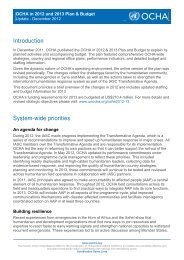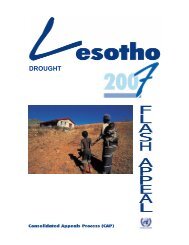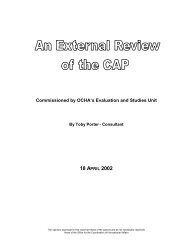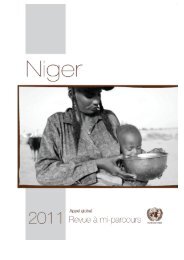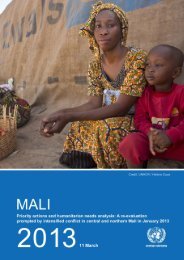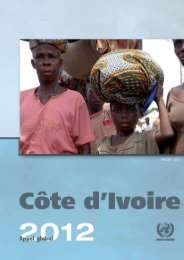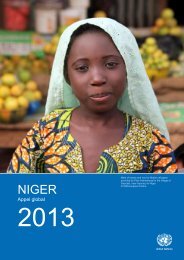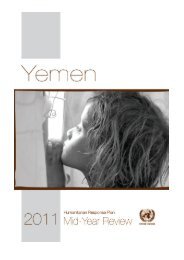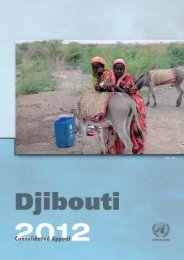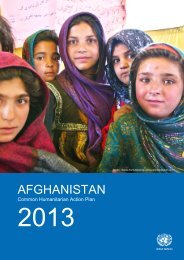BRIEFING KIT
BRIEFING KIT
BRIEFING KIT
- No tags were found...
You also want an ePaper? Increase the reach of your titles
YUMPU automatically turns print PDFs into web optimized ePapers that Google loves.
legislation needs to be adapted to facilitate international humanitarian assistance. Finally, there is at times acertain reluctance to formally request international assistance among some governments that lack capacityto respond to domestic emergencies. Regional networksMost Central Asian states are members of a range of overlapping security, economic and cultural networksand organizations that facilitate regional cooperation. Key organizations include the Collective SecurityTreaty Organisation, the Commonwealth of Independent States, the Economic Cooperation Organizationand the Shanghai Cooperation Organisation. These initiatives include various configurations of the ROCCAcountries working to establish regional cooperation.Most Caucasus states participate in regional cooperation networks, such as the Black Sea EconomicCooperation forum, the Black Sea Force, the Caspian Sea Force and the Georgia, Ukraine, Azerbaijan andMoldova Organization for Democracy and Economic Development. At the global level, NATO and theEuropean Union seek closer engagement in the Caucasus. 6The nearly established Centre for Disaster Response and Risk Reduction joined by Kazakhstan andKyrgyzstan initially and open for other interested states, became an example of collaboration through subregionalforums demonstrating that regional cooperation can be achieved through systematic and strategicengagement with ROCCA nations.III. OCHA REGIONAL STRATEGYCurrent focusThe office has reinforced existing local disaster management mechanisms to enhance local leadership insmall- to medium-scale natural disaster response. Governments and regional partners have applaudedefforts to increase cross-border and inter-agency collaboration, including the establishment of the CentralAsian Centre for Disaster Response and Risk Reduction. The centre serves as a hub for regional initiativesto improve cross-border cooperation in disaster preparedness, response and disaster risk reduction. MemberStates from Central Asia and the Caucasus are participating in international response mechanisms, such asINSARAG and UNDAC, and supporting humanitarian funding mechanisms such as Central EmergencyRelief Fund (CERF). Further integration of regional Member States in international response mechanisms isneeded.Cooperation with development banks is needed given their increasing role in early recovery activities and inresponse to the global food and financial crises. ROCCA has begun to map all early warning initiatives inCentral Asia to pull these together into a regular overview for all key stakeholders involved in disasterresponse in the region.Forward strategyIn 2012-13, ROCCA plans to provide a range of services across a diverse set of national and regionalcontexts. To address the vulnerabilities highlighted in part one of this strategy, and in line with OCHA’sStrategic Framework 2010-13 and Policy Instruction on Regional Offices, ROCCA’s priority areas for 2012-13 are as follows:Preparedness, early warning and contingency planningEnhance capacity to analyse vulnerability and evaluate risk factors in priority countries.Enhance collaboration between ROCCA and OCHA country offices in the region to ensure consistent,coherent and effective preparedness and humanitarian response.Promote inter-agency action to support capacity-building, disaster preparedness and emergencyresponse among humanitarian actors and with governments in the most vulnerable Member States. Therole of regional IASC Task Force is crucial in driving this initiative.Support to emergency responseEnsure first line of response through immediate surge to sudden-onset and slow-onset disasters in theregion. ROCCA staff will handover and provide support and guidance to any staff deployed through othermechanisms, such as ERR or standby partners.Provide specialized support to OCHA country offices, Humanitarian Country Teams, ResidentCoordinators and UN Country Teams in areas of OCHA expertise, such as CAP processes, CERF,disaster risk reduction, humanitarian advocacy and contingency planning.6 Current Geostrategy in the South Caucasus, Eurasia Net quoted October 2011 www.eurasianet.org/departments/insight/articles/pp010707.shtmlUnited Nations Office for the Coordination of Humanitarian Affairs (OCHA)Coordination Saves Lives | www.unocha.org




